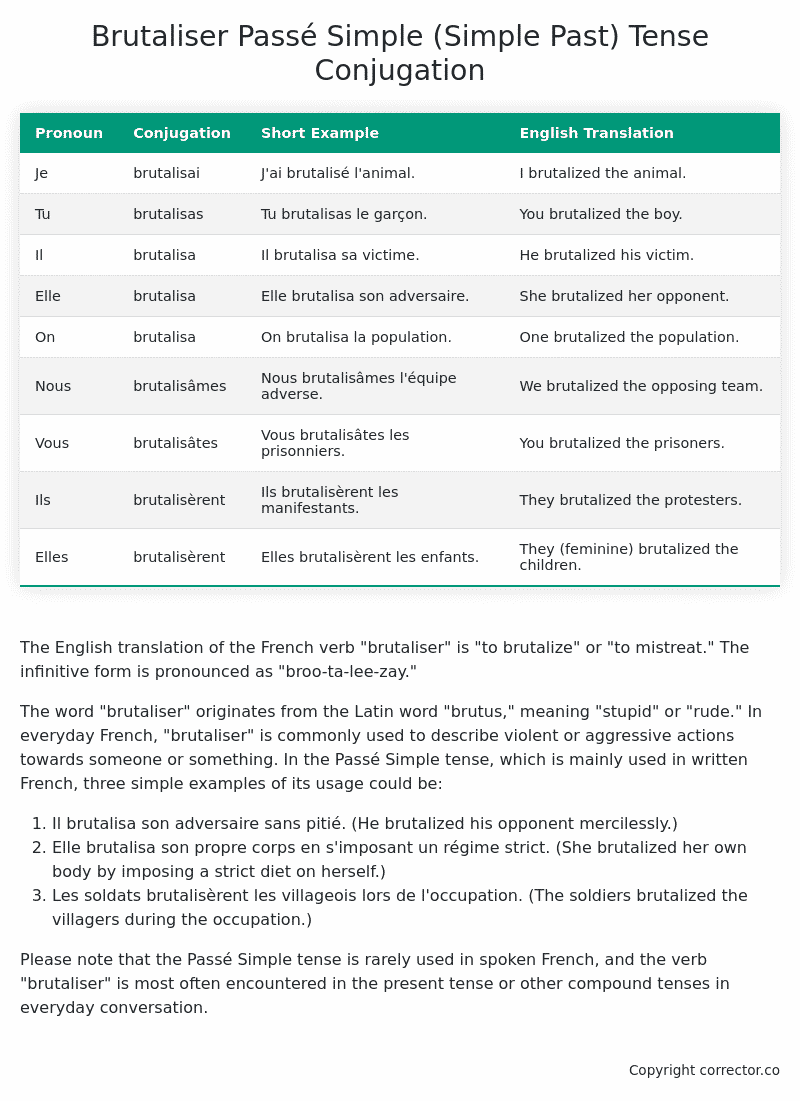Passé Simple (Simple Past) Tense Conjugation of the French Verb brutaliser
Introduction to the verb brutaliser
The English translation of the French verb “brutaliser” is “to brutalize” or “to mistreat.” The infinitive form is pronounced as “broo-ta-lee-zay.”
The word “brutaliser” originates from the Latin word “brutus,” meaning “stupid” or “rude.” In everyday French, “brutaliser” is commonly used to describe violent or aggressive actions towards someone or something. In the Passé Simple tense, which is mainly used in written French, three simple examples of its usage could be:
- Il brutalisa son adversaire sans pitié.
(He brutalized his opponent mercilessly.) - Elle brutalisa son propre corps en s’imposant un régime strict.
(She brutalized her own body by imposing a strict diet on herself.) - Les soldats brutalisèrent les villageois lors de l’occupation.
(The soldiers brutalized the villagers during the occupation.)
Please note that the Passé Simple tense is rarely used in spoken French, and the verb “brutaliser” is most often encountered in the present tense or other compound tenses in everyday conversation.
Table of the Passé Simple (Simple Past) Tense Conjugation of brutaliser
| Pronoun | Conjugation | Short Example | English Translation |
|---|---|---|---|
| Je | brutalisai | J’ai brutalisé l’animal. | I brutalized the animal. |
| Tu | brutalisas | Tu brutalisas le garçon. | You brutalized the boy. |
| Il | brutalisa | Il brutalisa sa victime. | He brutalized his victim. |
| Elle | brutalisa | Elle brutalisa son adversaire. | She brutalized her opponent. |
| On | brutalisa | On brutalisa la population. | One brutalized the population. |
| Nous | brutalisâmes | Nous brutalisâmes l’équipe adverse. | We brutalized the opposing team. |
| Vous | brutalisâtes | Vous brutalisâtes les prisonniers. | You brutalized the prisoners. |
| Ils | brutalisèrent | Ils brutalisèrent les manifestants. | They brutalized the protesters. |
| Elles | brutalisèrent | Elles brutalisèrent les enfants. | They (feminine) brutalized the children. |
Other Conjugations for Brutaliser.
Le Present (Present Tense) Conjugation of the French Verb brutaliser
Imparfait (Imperfect) Tense Conjugation of the French Verb brutaliser
Passé Simple (Simple Past) Tense Conjugation of the French Verb brutaliser (You’re reading it right now!)
Passé Composé (Present Perfect) Tense Conjugation of the French Verb brutaliser
Futur Simple (Simple Future) Tense Conjugation of the French Verb brutaliser
Futur Proche (Near Future) Tense Conjugation of the French Verb brutaliser
Plus-que-parfait (Pluperfect) Tense Conjugation of the French Verb brutaliser
Passé Antérieur (Past Anterior) Tense Conjugation of the French Verb brutaliser
Futur Antérieur (Future Anterior) Tense Conjugation of the French Verb brutaliser
Subjonctif Présent (Subjunctive Present) Tense Conjugation of the French Verb brutaliser
Subjonctif Passé (Subjunctive Past) Tense Conjugation of the French Verb brutaliser
Subjonctif Imparfait (Subjunctive Imperfect) Tense Conjugation of the French Verb brutaliser
Subjonctif Plus-que-parfait (Subjunctive Pluperfect) Tense Conjugation of the French Verb brutaliser
Conditionnel Présent (Conditional Present) Tense Conjugation of the French Verb brutaliser
Conditionnel Passé (Conditional Past) Tense Conjugation of the French Verb brutaliser
Conditionnel Passé II (Conditional Past II) Tense Conjugation of the French Verb brutaliser
L’impératif Présent (Imperative Present) Tense Conjugation of the French Verb brutaliser
L’impératif Passé (Imperative Past) Tense Conjugation of the French Verb brutaliser
L’infinitif Présent (Infinitive Present) Tense Conjugation of the French Verb brutaliser
L’infinitif Passé (Infinitive Past) Tense Conjugation of the French Verb brutaliser
Le Participe Présent (Present Participle) Tense Conjugation of the French Verb brutaliser
Le Participe Passé (Past Participle) Tense Conjugation of the French Verb brutaliser
Struggling with French verbs or the language in general? Why not use our free French Grammar Checker – no registration required!
Get a FREE Download Study Sheet of this Conjugation 🔥
Simply right click the image below, click “save image” and get your free reference for the brutaliser Passé Simple tense conjugation!

Brutaliser – About the French Passé Simple (Simple Past) Tense
Formation
Usage
Narration
Historical Context
Interactions with other tenses
Passé Composé
Imparfait
Conditional and Subjunctive
Summary
I hope you enjoyed this article on the verb brutaliser. Still in a learning mood? Check out another TOTALLY random French verb conjugation!


